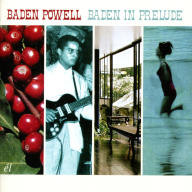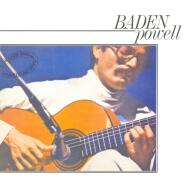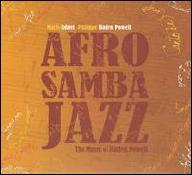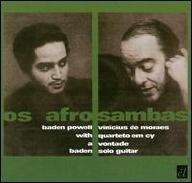Born in Varre-Sai in the state of Rio de Janeiro, he was baptized after his grandfather, a musician and conductor himself, whose father was an admirer of the Boy Scouts founder. When he was four months old, his family moved to the hill of São Cristóvão in the city of Rio. His father, the violonista Lino de Aquino, promoted regular get-togethers (rodas) of chorões at his home, at which famous names of Rio's music used to play, such as Pixinguinha, his brother China, the sambista Donga, and so many others. At eight, his father took him to Rádio Nacional where Powell met Meira (Jaime Florence), a famous violonista at the time a member of Benedicto Lacerda's regional. Powell would study violão with him for five years. Through Meira, a broad-minded musician, he discovered classics such as Segovia and Tarrega, along with Brazilian masters such as Garoto and Dilermando Reis. At nine, he presented himself at Renato Murce's show Papel Carbono on Rádio Nacional, winning first place as a guitar soloist. At 13, he used to run from school, earning his first cachets at the neighborhood parties. After finishing high school, he joined the cast of Rádio Nacional as an accompanist. In that time, he traveled through Brazil with the radio's singers. In 1955, he joined Ed Lincoln's trio, playing jazz at the Plaza nightclub. The place was a focal point for musicians, journalists, and aficionados interested in jazz. It should be regarded as the second place where bossa nova was being generated (the first being Cantina do César, after Johnny Alf's first appearances), contrary to the common notion of bossa being born at Zona Sul (South side's) apartments.
At that time, Powell began to compose Deve Ser Amor, Encontro Com a Saudade, Não é Bem Assim, and his first big hit, 1956's Samba Triste, with lyrics by Billy Blanco and which would be recorded by Lúcio Alves in 1960. In 1962, he met his future partner, Vinícius de Moraes, a composer, poet, singer, and diplomat. Their first song was Canção de Ninar Meu Bem, a great success from the beginning. Following that, they came up with Samba em Prelúdio (recorded still in 1962 by Geraldo Vandré/Ana Lúcia), Consolação (recorded by Nara Leão), Samba da Bênção, Tem Dó, Só por Amor, Bom Dia, Amigo, Labareda, and Samba do Astronauta (recorded by Powell in 1964). At this point, Powell was already a renowned musician and composer, with good connections on the artistic scene and wide exposure in the media. In that year, he accompanied Sílvia Telles at her famous show at the Jirau nightclub. In 1963, he recorded his first LP, Um Violão na Madrugada (Philips). In that year, he traveled to Paris where he presented himself at the Olympia theater with great success, using a repertoire of classical music and his own compositions. He also played regularly in a season at the Bilboquet nightclub and composed the soundtrack to the movie #Le Grabuje. In 1964, he returned to Brazil and recorded the LP À Vontade, which included a composition by Tom Jobim and Vinícius, Samba do Avião. He also wrote, in that year, the samba Berimbau with lyrics by Vinícius. Other duo's compositions that year were Além do Amor, Valsa sem Nome, Deve ser Amor, Canção do Amor Ausente, Consolação, Deixa, Amei Tanto, Tempo Feliz, and Samba da Bênção. The latter was included in Claude Lelouch's movie #Un Homme et une Femme, under the title Samba Saravah.
Traveling to Bahia, Powell stayed there for six months and researched the Afro traditions developed on Brazilian soil, especially the musical tradition emanating from the ancient sorcery rituals of candomblé and umbanda. The next phase of his compositional association with Vinícius would be called by Powell as the Afro-sambas, mirroring the findings of that period: 1965's Tristeza e Solidão and Bocoché and 1966's Canto do Xangô and Canto de Ossanha, the latter recorded by Elis Regina in 1966 with great success. Taking Bahia folklore, Powell added his Carioca touch, bringing the Afro tradition a more Brazilian feeling. In 1999, Powell, recently converted, regretted and deplored the Afro-samba phase as "devil's music" in a controverted and disappointing interview.
In 1965, fundamental singer Elizeth Cardoso presented Powell/Vinícius' Valsa do Amor que Não Vem at the first Festival of Brazilian Popular Music (TV Excelsior), São Paulo, winning second place. The next year, Aluísio de Oliveira produced another album by Powell, this time for his own landmark label Elenco, that deeply engaged in the use of the best musicians, leaving the commercial side in the background; unfortunately, it caused the excellent label's demise some years later. Taking advantage of the Brazilian tour of Caterina Valente, who was being accompanied by drummer Jimmy Pratt, de Oliveira took him and recorded Baden Powell Swings With Jimmy Pratt. Also in that year, TV Excelsior promoted the National Festival of Popular Music, at which novice Milton Nascimento won fourth place with Cidade Vazia (Powell/Lula Freire) and Powell with Vinícius recorded their Afro-sambas Canto de Xangô, Canto de Iemanjá, and Canto de Ossanha for Forma, along with Berimbau and Samba da Bênção. He also took a season with Elis Regina at Rio's nightclub Zum-Zum. The LPs O Mundo Musical de Baden Powell (Barclay/RGE), recorded in France; Baden Powell ao Vivo no Teatro Santa Rosa (Elenco); and Tempo Feliz
(Forma/Philips) were all recorded in 1966. In that period, he played in the U.S. with Stan Getz. In 1967, he recorded in Paris, France, the album O Mundo Musical No. 2, accompanied by the Paris Symphonic Orchestra. In that year, his O Mundo Musical de Baden Powell was awarded with the Golden Record in Paris and he presented himself at the Jazz Festival in Berlin, Germany, with American jazz guitarists Jim Hall and Barney Kessel. In 1968, a novice Paulo César Pinheiro (now a renowned samba composer) composed with Powell the samba Lapinha, which was presented by Elis Regina at the TV Record's first Samba Biennial, winning first place. The duo would also compose, among others, Cancioneiro, Samba do Perdão, Meu Réquiem, É de Lei, Refém da Solidão, Aviso aos Navegantes, and Carta de Poeta. Also from 1968 is the LP Baden Powell (Elenco) with the famous Manhã de Carnaval or Carnival, by Luís Bonfá and Antônio Maria, and the show O Mundo Musical de Baden Powell. In 1969, he recorded Vinte e Sete Horas de Estúdio (Elenco). Next year in Paris, he recorded for Barklay the three-album box set Baden Powell Quartet and the LP Baden Powell, which had Pixinguinha's songs. For Elenco, he recorded the LP Estudos. In 1972, he recorded for Philips the LP É de Lei. Solitude on Guitar was recorded the next year in Germany and in 1974, he recorded in Paris the live LP Baden Powell (Barklay/RGE), and in 1975 recorded the LP Baden Powell Trio Ópera de Frankfurt. He then moved to Baden-Baden (Germany), staying there for four years. In 1994, already living in Brazil again, he released the record Baden Powell de Rio à Paris. In that same year, he performed together with his sons, Louis Marcel (violão) and Phillipe (piano), at the Cecília Meireles Hall in Rio, with the concert recorded and released on a CD, titled Baden Powell Filhos, through CID. In 1995, his concert at the Montreux Festival was recorded on CD under the title Baden Powell Live in Montreux. Also in that year, he was awarded with the Prêmio Shell for his complete works. In 1996, he toured in France with Brazilian accordionist Sivuca and recorded the CD Baden Powell Live at the Rio Jazz Club. After spending several weeks in the hospital, Baden Powell died on September 26, 2000, at the age of 63. ~ Alvaro Neder, Rovi


















